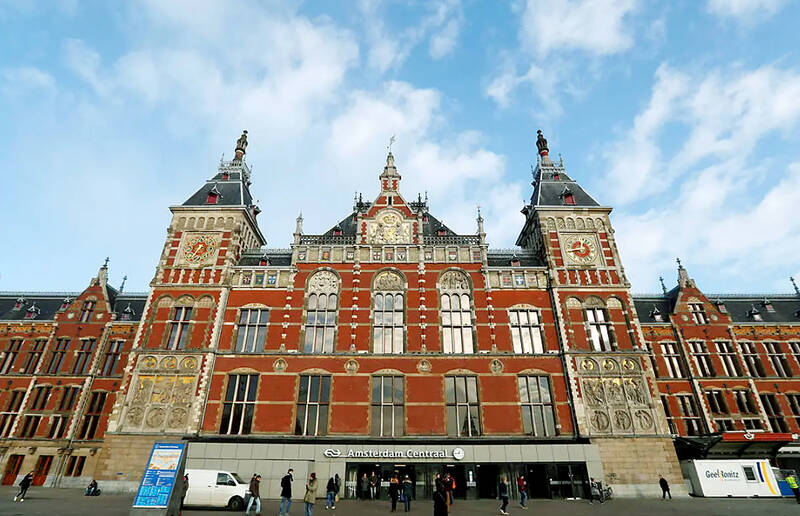The Dutch government is working on legislation that would be used to bar Chinese students from university programs on sensitive technologies, including semiconductors and defense, people with knowledge of the matter said.
While language in the planned legislation would likely avoid specifically mentioning China, the clear intention is to prevent students from the Asian nation gaining access to sensitive material in their studies, the people said, asking not to be identified as the deliberations are private.
The measures, still in draft phase, are the latest escalation in a diplomatic fight between the Netherlands and China over the semiconductor industry. The Dutch government earlier this year agreed to join the US effort to further restrict exports of chip technology to China and started an investigation into the takeover of local chipmaker Nowi by Chinese-owned firm Nexperia, stoking tensions with one of its biggest trading partners.

Photo: Reuters
The Dutch Ministry of Education confirmed in an e-mailed statement it is working on measures to introduce a mandatory screening of students and researchers in sensitive subject areas.
It added that any measures would be country-neutral and not target any specific country.
A recent Dutch intelligence agency report claimed that China “poses the greatest threat” to the nation’s economic security.”
It said that many Dutch companies and institutions find it difficult to make a proper risk assessment of economic and scientific cooperation with China.
“The country often conceals that the Chinese government or the Chinese army may be involved in such cooperation in the background,” the report said. “The disadvantages of cooperation often only become apparent in the longer term.”
It also said that China targets Dutch high-tech companies and institutions through “corporate takeovers, academic cooperation, as well as illegitimate [digital] espionage, insiders, covert investments and illegal exports.”
Earlier this year, ASML Holding NV, a critical cog in the global semiconductor industry, accused a former China-based employee of stealing confidential information. The Dutch technology company, which makes machines needed to produce high-end chips used in everything from electric vehicles to military gear, initiated an internal investigation and tightened security controls after discovering the incident, which might have violated export controls.
The Netherlands, one of the world’s top sources of machinery and expertise needed to make advanced semiconductors, is facing increasing pressure from Washington to help forge a global blockade to stifle Beijing’s rise in chipmaking. ASML is the country’s and Europe’s most valuable tech company, and China is one of its biggest customers.
The Dutch have been navigating a middle ground between the US and China in the escalating battle over the world’s chip supply chain. Dutch measures to expand restrictions on exports of the latest chip technology appeared to fall short of measures that the administration of US President Joe Biden took last year, as Washington spearheads efforts to limit exports of machinery and know-how to China.

Incumbent Ecuadoran President Daniel Noboa on Sunday claimed a runaway victory in the nation’s presidential election, after voters endorsed the young leader’s “iron fist” approach to rampant cartel violence. With more than 90 percent of the votes counted, the National Election Council said Noboa had an unassailable 12-point lead over his leftist rival Luisa Gonzalez. Official results showed Noboa with 56 percent of the vote, against Gonzalez’s 44 percent — a far bigger winning margin than expected after a virtual tie in the first round. Speaking to jubilant supporters in his hometown of Olon, the 37-year-old president claimed a “historic victory.” “A huge hug

Two Belgian teenagers on Tuesday were charged with wildlife piracy after they were found with thousands of ants packed in test tubes in what Kenyan authorities said was part of a trend in trafficking smaller and lesser-known species. Lornoy David and Seppe Lodewijckx, two 19-year-olds who were arrested on April 5 with 5,000 ants at a guest house, appeared distraught during their appearance before a magistrate in Nairobi and were comforted in the courtroom by relatives. They told the magistrate that they were collecting the ants for fun and did not know that it was illegal. In a separate criminal case, Kenyan Dennis

A judge in Bangladesh issued an arrest warrant for the British member of parliament and former British economic secretary to the treasury Tulip Siddiq, who is a niece of former Bangladeshi prime minister Sheikh Hasina, who was ousted in August last year in a mass uprising that ended her 15-year rule. The Bangladeshi Anti-Corruption Commission has been investigating allegations against Siddiq that she and her family members, including Hasina, illegally received land in a state-owned township project near Dhaka, the capital. Senior Special Judge of Dhaka Metropolitan Zakir Hossain passed the order on Sunday, after considering charges in three separate cases filed

APPORTIONING BLAME: The US president said that there were ‘millions of people dead because of three people’ — Vladimir Putin, Joe Biden and Volodymyr Zelenskiy US President Donald Trump on Monday resumed his attempts to blame Ukrainian President Volodymyr Zelenskiy for Russia’s invasion, falsely accusing him of responsibility for “millions” of deaths. Trump — who had a blazing public row in the Oval Office with Zelenskiy six weeks ago — said the Ukranian shared the blame with Russian President Vladimir Putin, who ordered the February 2022 invasion, and then-US president Joe Biden. Trump told reporters that there were “millions of people dead because of three people.” “Let’s say Putin No. 1, but let’s say Biden, who had no idea what the hell he was doing, No. 2, and